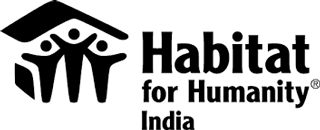About
-
Headquarters
Mumbai, Maharashtra
-
Since
1976
Habitat for Humanity India is part of an international organisation known as Habitat for Humanity International. It works to help underprivileged sect Read moreions of society realize their dream of owning a house with appropriate sanitation facilities. It aims to empower people through shelter and works with partners and Government agencies to enhance its reach. Its efforts in India are inspired by the sustainable development goal of the United Nations that calls for building sustainable cities and communities and in equal measure from the Pradhan Mantri Awas Yojana to provide affordable housing for the needy urban and rural populations. It follows a three-step process of studying the communities’ needs, securing relevant funds and then proceeding with construction activities.
Cause Area
Sub Sector
Impact
Habitat for Humanity India has helped build over 62,998 homes, 72,638 sanitation units and assisted over 14,23,886 families to rebuild their lives after a disaster.
Programs
-
Housing Programme
Habitat for Humanity India minutely studies the needs of underprivileged communities and family needs within the community and focuses on building quality houses with locally sourced materials. The Trust ensures that its buildings conform to both the Government’s and its own quality control standards.
Homes built by the Trust provide that each person is allocated at least 3.5 meters of usable area or at least two rooms per home. It only uses materials which pass its specifications of quality and is built to withstand natural calamities in such areas. Special attention is paid to the construction of accessible sanitation facilities with proper drainage systems.
Beyond construction, the Trust also trains small institutions to provide micro-finance, equip homeowners with knowledge of repair and maintenance and property papers.
-
Sanitation Programmes
Aligning to the United Nations' sustainable development goal of providing clean water and sanitation and the Government of India’s Swachh Bharat Abhiyan, the Trust works to build accessible sanitation facilities in communities and schools.
This effort is intended to help protect the dignity of women and girls and improve community well-being through improved hygiene and sanitation. It goes through a selection process to identify schools that are in acute need of sanitation facilities, proceeds to implement construction by itself or through partners and provides technical assistance as required.
In addition to the construction of sanitary amenities, the Trust provides funds through its CSR activities to communities that want to construct their own facilities, drive change in behaviour against open defecation and is exploring the possibility of using access cards to track usage of such facilities.
-
Disaster Risk and Response Programme
The Trust is actively involved in disaster response missions due to its expertise in the construction space. It undertakes rehabilitation and repair of shelters and homes in areas prone to natural calamities, provides essentials in the form of kits to affected people, helps build temporary shelters for people to tide over immediate difficulties and rebuilding of destroyed homes and community facilities.
To reduce risk from disasters it promotes the construction of disaster-resistant homes and through a team of specialists trains communities in disaster response to act as first-level assistance in crisis situations.
Impact Metrics
-
Lives Impacted With New or Improved Homes
Year-wise Metrics- 2016-17 726
- 2017-18 1501
- 2018-19 1956
- 2019-20 4080
- 2020-21 2025
-
Built Individual Household Latrines
Program Name
WASH Project
Year-wise Metrics- 2016-17 7964
- 2017-18 4692
- 2018-19 2924
- 2019-20 1823
- 2020-21 52
Leadership Team
Demographics & Structure
-
No. of Employees
100+
M&E
-
Internal, External Assessors
No
Policies
-
Ethics and Transparency Policies
No
-
Formal CEO Oversight & Compensation Policy
No
Political & Religious Declarations
-
On Affiliation if any
No
-
On Deployment Bias if any
No
Registration Details
-
PAN Card
AAATH4809C
-
Registration ID
700
-
VO ID / Darpan ID
DL/2017/0165188
-
12A
AAATH4809CE20214
-
80G
AAATH4809CF20056
-
FCRA
231660981
-
CSR Registration Number
CSR00000402
Other Details
-
Type & Sub Type
Non-profit
Trust
Website
Financial Details
-
2018-19
IncomeRs.573,515,377ExpensesRs.565,530,556Admin ExpensesRs.66,753,023Program ExpensesRs.498,777,533Tip: Click on any value above to exclude it. -
2019-20
IncomeRs.657,526,298ExpensesRs.663,755,458Admin ExpensesRs.39,311,350Program ExpensesRs.624,444,108Tip: Click on any value above to exclude it. -
2020-21
IncomeRs.844,577,434ExpensesRs.758,151,749Admin ExpensesRs.68,807,785Program ExpensesRs.689,343,964Tip: Click on any value above to exclude it. -
2021-22
IncomeRs.880,123,337ExpensesRs.875,667,514Admin ExpensesRs.58,582,242Program ExpensesRs.817,085,272Tip: Click on any value above to exclude it.



